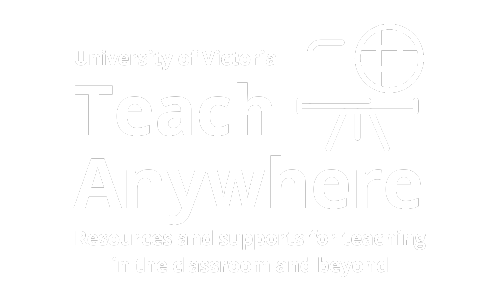Background and purpose
The use of Generative Artificial Intelligence (GenAI) in higher education has become a topic of discussion in the post-secondary education sector. GenAI is a form of machine learning with the capabilities to produce text, images, video, music, code, etc. Conversations have focused on concerns relating to impacts on teaching and assessment practices, academic integrity issues, and the learning environment more broadly. Although there are potential opportunities with the use of GenAI in the higher education context, there are also ethical concerns regarding the use of these tools that must be addressed.
This year, LTSI formed the Artificial Intelligence and Assessment Redesign Working Group (AI working group) with the purpose of carefully reviewing and evaluating strengths and limitations of GenAI tools. Deliverables and recommendations from this working group are described below.
Working group deliverables

1. Literature review
Analyzed a total of 150 publications from 34 peer-reviewed journals and blog posts, short articles and commentaries, published between 2013 and 2023, focused on GenAI tools and their use in learning and teaching in higher education.

2. Environmental Scan
Examined websites from 24 research intensive universities and a review of the policies and guidelines housed in the Observatory on AI Policies in Canadian Post-Secondary Education created by Higher Education Strategy Associates.

3. Consultation process
Using a set of guiding questions, provided a total of 13 consultations in person and virtually with students, faculty/librarians, and campus stakeholders taking place between March and June, 2023.
Working group membership
Artificial Intelligence and Assessment Working Group: Shailoo Bedi (Chair), Executive Director LTSI; Sharon Dias, PhD Candidate, GEOG; Erin Kelly, Director, ATWP; Erin McGuire, Associate Teaching Professor, ANTH; Ammie Kalan, Assistant Professor, ANTH; Hayley Hewson, Manager, Learning Experience Design; Alex Warrington, Manager, Educational Technology; Nan Ami, Manager, Centre for Academic Communication; Karen Munro, Director, Engagement & Learning – Libraries; Hajime Kataoka, Associate Director Online Learning, UVCS; Nico De Marco, Administrative Assistant to the Executive Director – LTSI
Position statement
Introduction
The University of Victoria (UVic) encourages innovative teaching practices and supports instructors who may like to adopt new pedagogical approaches and learning technologies. Generative Artificial Intelligence (GenAI) is a form of machine learning with the capabilities to produce text, images, video, music, code, etc. Using machine learning algorithms, GenAI can generate content requested by a human user based on prompts. GenAI tools (GAITs) are rapidly evolving and becoming more widely available. Harnessed appropriately and ethically, this technology can offer exciting new approaches to learning and teaching and prepare students to engage with GAITs beyond the post-secondary education context.
UVic does not have a general ban on the use of GAITs including ChatGPT. Instead, UVic embraces the appropriate and ethical use of GAITs in learning and teaching. We recognize potential concerns associated with the use of GAITs, including potential biases in the algorithms and the possibility that GenAI might be used in ways that violate academic integrity principles and intellectual property rights. Faculty and instructors are best positioned to make decisions about the use of GAITs in their courses. We offer the guidelines below to support faculty, instructors and students in the responsible, effective, and ethical use of artificial intelligence tools. These guidelines also support principles of academic integrity and help to prepare students for a future where the use of GAITs continues to evolve.
Generative Artificial Intelligence Statement
The University of Victoria:
Embraces the integration of GAITs in a responsible, ethical and equitable manner that enhances learning and teaching as appropriate. However, UVic does not permit instructors to use GAITs to grade students’ work at this time. The use of GAITs for self-assessment is encouraged.
Commits to supporting faculty, instructors, students and staff to understand how GenAI works and to develop skills for effective and responsible use of GenAI and other digital tools, through workshops, podcasts and toolkits offered by the Division of Learning and Teaching Support and Innovation.
Provides course syllabi templates and sample statements on use of GAITs; suggestions for teaching and assessments integrating the use of artificial intelligence; and opportunities to share knowledge and experience teaching with artificial intelligence within and across disciplines.
Supports the integration of GAITs in learning and teaching where it is appropriate, responsive to disciplinary needs and respectful of intellectual property rights.
Encourages faculty and instructors to determine when and how GAITs may be used in their courses and to provide in the course outline clear instructions to students regarding permissible use of GenAI tools. Faculty and instructors who integrate artificial intelligence in their courses are encouraged to discuss the benefits, risks, and limitations of such tools and to teach students about ethical and responsible use of GAITs.
Recognizes that the un-cited or unauthorized use of GenAI in course work may constitute a violation of the university’s Academic Integrity policy. To avoid academic integrity violations, students must familiarize themselves with UVic’s Academic Integrity policy and with the permissible use of GAITs in each course as determined by the instructor and as explained in the course outline.
Commits to evaluating, responding to, and supporting research on the use of GAITs in higher education.
Recommendations
Upon completing the literature review, environmental scan and consultations, the AI working group has provided the following recommendations:
Ensure that the UVic academic integrity policy is up to date and makes reference to the use of GenAI, providing further information on differences between a guideline and senate approved policies.
Encourage the creation of discipline specific guidelines, including standards and limitations for the use of GenAI in classes and for assignments, thesis and dissertations.
Provide guidance on GenAI use and copyright implications as they develop.
For further information
You can read the full report: Generative Artificial Intelligence and Assessment – a summative working group report below.
Training opportunities and resources
In addition to the above recommendations, the working group suggested the creation of the following training opportunities and resources.
Web resources and external sources
Written by instructors, students, and staff that contribute to knowledge and applications for teaching and learning.
Training opportunities
Which include workshops, webinars, lectures, infographics, and group discussions.
Funding initiatives
Including teaching grants to support experimentation, usage and issues related to GenAI.
More information coming soon!
Contact information and FAQs
To answer specific questions regarding GenAI, privacy and policy considerations.
More information coming soon!
Syllabus statements
For instructors to use and adapt in their courses for transparent direction to students.
Awards
For instructors that (re)designing their course to address ethical use of GenAI and highlighting best practices.
Learn about our teaching award for innovative and inclusive course design!
Syllabus examples
Depending on the course and/or discipline you may want to allow, or even encourage the use of GenAI, or you may want to limit or prohibit use.
Below are draft statements intended to highlight for students what is permitted and what is not. These statements can be used for undergraduate or graduate level courses and can be adapted as necessary.
Situation 1: GenAI not allowed
Please be advised that in this course you are not authorized to use any form of generative AI. In order to successfully complete course activities, generative AI is not required nor welcomed. Students should not make any use of generative AI tools such as ChatGPT, Grammarly, among others that use AI for content generation and editing. As the University of Victoria states on its Academic Integrity Policy “Academic integrity requires commitment to the values of honesty, trust, fairness, respect, and responsibility.” Therefore, I expect you to comply with the course syllabus and I encourage you to enhance your academic experience in this course by refraining from use generative AI.
Situation 2: GenAI is partially allowed
In this course, you are limitedly authorized to make the use of generative AI such as ChatGPT. Below are the specific assignments and activities that you can work together with generative AI. In order to not violate academic integrity, you must cite ChatGPT or any other tool properly using one of the following styles: APA style, Chicago [insert any other style accepted by instructor]. Additionally, you must add as an appendix all the prompts and questions used within the generative AI to create content as an appendix. For all the other activities in this course, please refrain from using any generative AI. Please not that you can opt for not using generative AI at all to successfully complete all the courses requirements.
[list assignments and/or activities that students can use GenAI if they wish]
Situation 3: GenAI is allowed
In this course I welcome the use of generative AI for assignments completion and during activities in the classroom. Therefore, you are authorized to use generative AI tools such as ChatGPT. Please note that you can opt for not using generative AI at all as well to complete all the courses assignments successfully. In the case you opt to use generative AI, you must provide proper citation of the tools you used and describe how you used it (for initial research, preparing outline, editing etc).
Although the course allows the use of generative AI, please be aware of the following flaws when using the tools:
· Generative AI does not fact check
· Generative AI may provide bias and inaccurate answers
· Generative AI hallucinates and may provide false or/and made up information
· Generative AI does not critically analyzed content
*Please note: when allowing students to use GenAI for a course, be aware that some AI applications may cause student concern about cost, security, equity and privacy. Students should not be required to use a technology that is not part of the UVic learning technology ecosystem. Consider offering students a choice to opt-out by offering alternative options.
Age of GenAI Workshops
Talking to students about GenAI
Custom training
We can also provide training or custom workshops to your team or department related to the following topics:
- How to interpret GenAI outputs
- Ethical usage of GenAI in course design and training
- Building out assignments using GenAI or how to redesign your assessments
